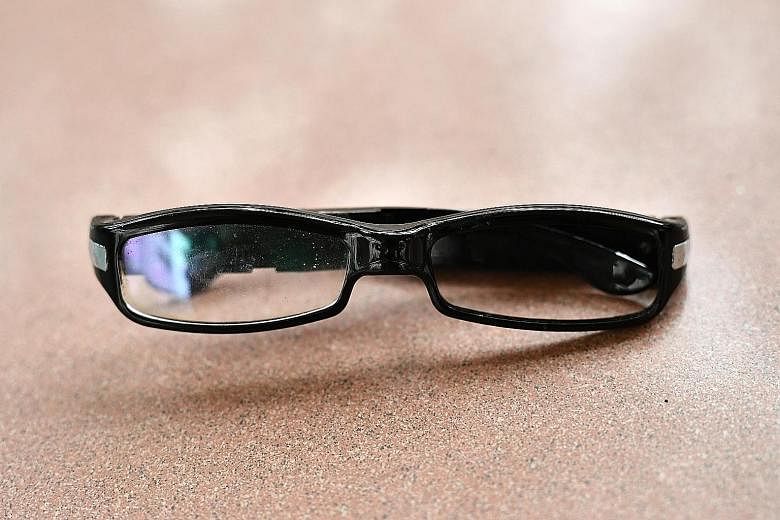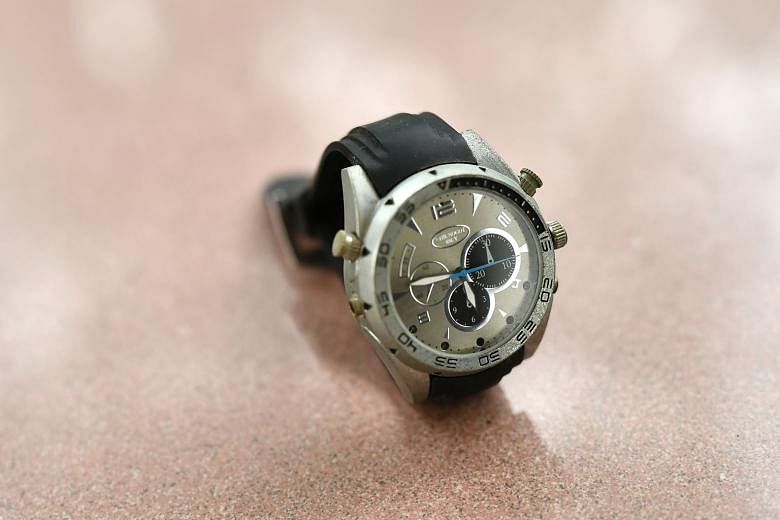Work for security executive Davy Chan, 70, at a condominium in Jurong East may be routine, even mundane.
But behind that kindly smile hides a steely man who has led an eventful life. He was a private investigator for over 30 years and a police officer for 12 years.
Ask, and he will tell you about that barely visible mark on his neck. A bullet had burned through him in 1972, leaving the young detective with a gaping wound about the size of a 20 cent coin.
It almost killed him.
"I'm still walking. I was paralysed for five days," said Mr Chan. "I was supposed to be paralysed for life."
He had stumbled upon Mustapha Hassan, one of two brothers wanted for a series of armed robberies, and tailed the wanted man with two of his colleagues.
When the detectives confronted Mustapha, a struggle ensued.
Mr Chan, who was then 25, shot at the side of Mustapha's body. At the same time, Mustapha fired twice at Mr Chan from close range. One bullet tore through his neck.
Although he received the Police Gallantry Medal in 1976, he left three years later.
He felt the lack of an O-level certificate had held him back so he signed up for three subjects, studied for the examinations and passed. Then he quit.
Becoming a private investigator a few years later allowed him to continue doing police-like work at his own time and cost.
There was no lack of excitement, he said. In 1985, he cracked a case in four hours - his personal best.
"I was with a client who wanted evidence that his wife was going out with the manager of her company," said Mr Chan.
Taking the husband with him, he tailed the pair from their office as they left for dinner. After the meal, Mr Chan and his client saw the couple drive a van into a dark lane.
They waited 15 minutes before crawling towards the vehicle - "like in the army" - and placing boulders behind it to prevent it from reversing.
They then confronted the wife and her manager. When the manager tried to speed off, Mr Chan flung his old Nokia phone at his windscreen in a bid to stop them. The window broke.
"I then picked up the Nokia and called the police (to ensure there was a record of the incident)," said Mr Chan.
"It was a good phone," he added with a chuckle.
Often, clients needed such evidence to separate from their spouses.
Most of his private investigation cases involved matrimonial issues.
But in the 1990s, he took on a different mission: to locate and stop a client's son from undergoing a sex-change operation in Thailand, near the border of Cambodia.
The 21-year-old man had flown abroad with $25,000, in hopes of successfully going under the knife, recalled Mr Chan.
The area the young man was headed to was controlled by crime syndicates but Mr Chan said he got there safely with help from the local army.
"We found the place - a hospital and hotel where people stay to wait for their scheduled operation," he said. "We pushed open the door, brought him out, and drove all the way back to Bangkok with him."
The drive took about four hours.
Fearing that the young man might take his life after his plan was foiled, Mr Chan talked to him all night until it was time for their flight back to Singapore the next morning. It was all done in under 24 hours.
There was never a typical day in private investigation.
"It doesn't matter if it's rain or shine... We study the target's movement and when we need to start work, we do," he said.
"There is no time where you work from 9am to 5pm. For example, if the fellow goes out to the pub, it ends at 3am," he said.
Mr Chan said a private investigator needs to have street smarts and ground knowledge.
For instance, it is easier to stay unnoticed on a motorcycle when tailing someone, he said. And it helps to know the roads - how long a red light takes to turn green, or how many times a green arrow flicks.
Private investigators have to stay focused for hours on end during a stakeout but one must be prepared for surprises too, he said.
A target might realise he is being tailed and confront the investigator, whose body language should not betray shock.
Some of his training, he said, came from his time with the police force.
"During my time, gang activities were rampant," said Mr Chan, who grew up in Kampong Silat.
When he was a young boy, he was surrounded by six others at a swimming pool and was robbed of a pair of Japanese slippers that he had saved up for.
"I said (to myself), this is too much. When I join the force, I'm going to get you gangs," he recalled. "That's how I started."
He still keeps a pair of spy glasses - black-rimmed spectacles with a hidden camera - and a watch with recording capabilities.
"These are for close-ups," he added, showing the glasses to The Straits Times. Keepsakes, he said.
Like the faint mark he wears as a badge of honour.
He never chose his professions, he said, adding: "I wouldn't say I chose (it). We're fated to be in this line."




